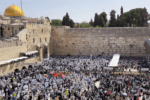Read Time: 5 Minutes 49 Seconds
I don’t know about you, but to me, when I read about Hagar, Abraham, Sarah, Ishmael and Isaac, those chapters are some of the most frustrating in the Bible. When we read the short history of their lives that the Bible provides, we are both bewildered by their extreme faith and their extreme lack of faith.
As we read their narrative, we see one of the most dysfunctional and broken families in history. Yet within their story is also one of the most powerful lessons in the Bible, a lesson that the body of believers desperately needs today.
While this lesson is powerful and vital to us as believers, it is not what we would consider the main theme of the story and we might miss something that could be life changing and empowering. For the sake of space, I am going to begin in Genesis 21, which is after Isaac has been born and Ishmael is already a young child. We read these words:
“So Abraham got up early in the morning and took bread and a skin of water and gave them to Hagar, putting them on her shoulder, and the child, and sent her away. She went and wandered about in the wilderness of Beer-sheba. When the water from the skin was finished, she abandoned the child under one of the bushes. Then she went and sat herself down opposite, about a bowshot away, for she had said, ‘I can’t bear to see the child dying!’ So she sat down opposite and lifted up her voice and wept” (Gen. 21:14-16).
There are a couple of important things that are within this section of Scripture that most of us do not pay too much attention to because they get lost within the larger story taking place. The first is that as we read Genesis 21, Ishmael is never called by name; he is referred to as a child and a son, but not by his actual name. The second thing is that we are told that when Hagar left, she went to Beer-Sheba. The third thing we notice is the use of “a bowshot away” as a measurement of distance. Each of these things may seem minor parts of the story, but they all are major for our understanding of what is happening. If we don’t understand these three things, we will miss out on something extremely important and strength giving for us as believers in Yeshua.
Let’s start with using a bowshot as a measurement of distance. This measurement is not the traditional measurement we see in the Bible. Remember back just a few chapters when G-D was giving measurement directions to Noah? He used cubits, not a bowshot. The use of a bowshot as a measurement was used by Egyptians, not Hebrews.
This little nugget gives us a glimpse into the mindset of Hagar at this moment in time. Hagar was an Egyptian who left Egypt with Abraham. Yet, when this crisis arose, she returned, at least in her heart and mind, to her Egyptian past—very similar to how the Israelites cried out to return to Egypt when difficulties arose in the wilderness.
The second thing we notice is that Ishmael’s name is not used in these passages. The reason for this may be because Ishmael means “G-D hears” and, again at this point in Hagar’s life, things were not going the way she hoped they would, so she had stopped believing, at least for a short time, in the G-D who hears.
The third thing we notice is the location that Hagar traveled to: Beer-Sheba, which in Hebrew means seven wells.
Let’s look at these events in a broader context now that we know these three things. Abraham and Hagar have a son named Ishmael. G-D tells Abraham that although Ishmael will not be the heir to Abraham, nonetheless, Ishmael will be blessed and become a great kingdom—Genesis 21:13:
“Yet I will also make the son of the slave woman into a nation, because he is your seed.”
Abraham tells Hagar that she and Ishmael must leave and it appears that as soon as this disconcerting event takes place, Hagar travels to Beer-Sheba. She places her son under a bush and travels a bowshot away so she will not hear him as he dies. In her heart, Hagar has turned back to Egypt in the way she thinks. She rejects Ishmael’s name because she no longer has faith that G-D hears. How do we know that her doubt has caused her to become spiritually blinded?
Because she is in Beer-Sheba, a place with abundant water, a place named for its seven wells. Yet, Hagar is so heart-blinded by her disappointment and grief that she is going to let her son die from thirst simply because she can’t see the wells right in front of her. Notice what we read in Genesis 21:17-19:
“Then God heard the boy’s voice and the angel of God called to Hagar from heaven, and He said to her, ‘What troubles you, Hagar? Do not be afraid, because God has heard the boy’s voice where he is. Get up! Lift the boy up, and hold on to him with your hand, for I will make him a great nation.’ Then God opened her eyes and she saw a well of water, and she went and filled the water skin, and gave the boy a drink.”
These words are powerful. In G-D’s response to Hagar’s situation, the Bible doesn’t say G-D heard Hagar; it says that G-D heard Ishmael, her son, whose name means G-D hears. Then Hagar is reminded of G-D’s promise to make Ishmael a great nation, and it is at this point that G-D opened Hagar’s eyes to see the well of water right in front of her.
You may be saying to yourself, Wow! That is really cool! But, how does this affect me today? The answer is that just like Hagar, G-D has given us promises that He will fulfill in our life. But, also just like Hagar, there are going to be times when G-D’s fulfillment doesn’t happen the way we expect it to. When these times happen (and they will), we must guard our hearts against becoming so disappointed and disillusioned by our dashed expectations that we become blinded to the fullness of G-D’s promises which lie right in front of us.
There is an old Jewish saying that says, “We plan, G-D laughs.” G-D has plans for you. Jeremiah 29:11 is just as true today as when the prophet spoke it all those years ago:
“’For I know the plans that I have in mind for you,’ declares Adonai, ‘plans for shalom and not calamity—to give you a future and a hope.’”
One more thing about the story of Hagar that is often missed is that after G-D opens her eyes and reminds her of His promises to her and Ishmael, we read these words:
“God was with the boy and he grew. He dwelled in the wilderness and became an archer,” (Gen. 21:20).
Notice that Ishmael becomes an archer. G-D placed a reminder of Hagar’s moment of doubt (she went a bowshot away) right in front of her eyes. Not so she would remember her doubt, but so she would always be reminded that even in her doubt, G-D hears.
Today, we have a similar reminder: our Bibles, which are right in front of us reminding us of all those that G-D heard even in their doubt. I hope that when life gets difficult, when life isn’t going the way you thought it would, when G-D isn’t following your plans to fulfill His promises, you will remember Hagar’s vision—both when she lost it, and more importantly, how it was restored.
Bring Charisma magazine home with a subscription today!
Eric Tokajer is the author of “Overcoming Fearlessness,” “What If Everything You Were Taught About the Ten Commandments Was Wrong?,” “With Me in Paradise,” “Transient Singularity,” “OY! How Did I Get Here?: Thirty-One Things I Wish Someone Had Told Me Before Entering Ministry,” “#ManWisdom: With Eric Tokajer,” “Jesus Is to Christianity as Pasta Is to Italians” and “Galatians in Context.”







Leave a Comment
You must be logged in to post a comment.